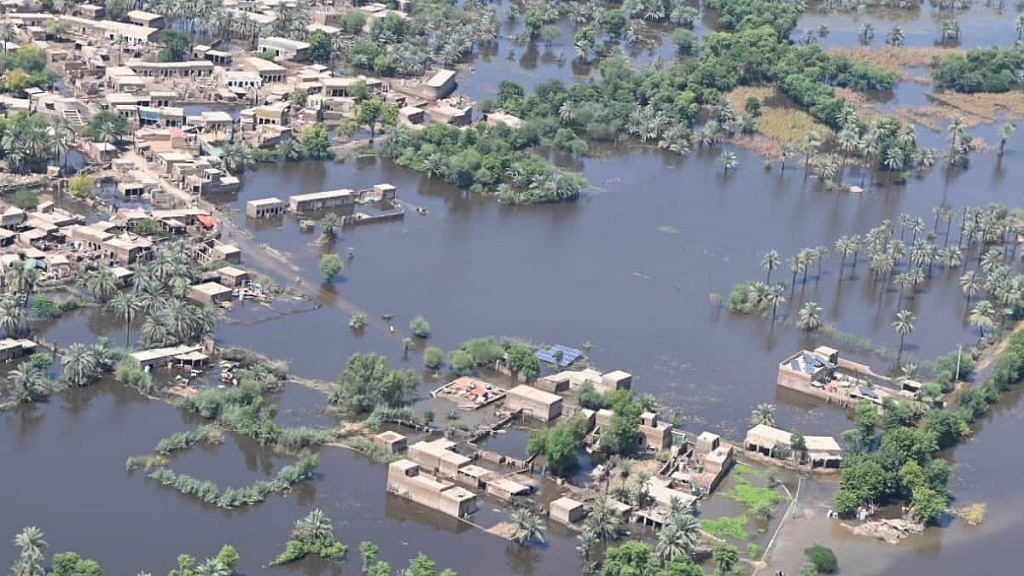New Delhi: The massive flooding of farmlands, destruction of crops, and loss of livestock in Pakistan have raised questions about the country’s food security, especially as the winter approaches.
About 170,000-sq km of area in Pakistan, which is already reeling under rising food prices, is reportedly submerged, out of which 78,000 square km area of crops cultivated across 57 districts are underwater.
It has also been estimated that roughly 65 per cent of the country’s food basket — particularly crops like rice, cotton, wheat and onion — have been washed away.
Pakistan Foreign Minister Bilawal Bhutto-Zardari, in an interview to CGTN earlier this week, offered an even starker outlook by saying that “about 80 to 90 per cent” of the country’s crops have been damaged by the floods.
In parts of Sindh, chilli, sugarcane, and date palms have also taken a hit. Sindh CM Adviser on Agriculture Manzoor Wassan told Dawn that agricultural loans provided to the growers during this year’s Kharif season in rain-affected areas may be rescheduled and the interest on the loans could be waived.
Prior to the floods, Pakistan was already struggling with rising food prices and inflation brought in by Russia’s invasion of Ukraine. But, the federal government now estimates that the economic impact of floods could be at least $10 billion, which is about three per cent of the country’s GDP.
Though the International Monetary Fund (IMF) approved the release of $1.1 billion to Pakistan Monday, as part of its bailout program which began in 2019, the damage to the country’s agricultural infrastructure is estimated to be around $20 billion.
“The agricultural sector is in turmoil. The cotton crop and vegetables are completely wiped out in many key areas. Wild weather just can’t give us a break. First the heat wave, now the floods,” Pakistan Businesses Forum vice president Ahmad Jawad, who grows wheat, maize, citrus, and sugarcane, told Bloomberg.
According to experts, the current floods are larger than those that occurred in the Indus River in 1973 and 1976.
Also Read: A menstrual campaign amid Pakistan floods is making right noises. But some men can’t take it
‘Crisis in Pakistan could affect Afghanistan’
Farmers in flood-hit areas have voiced their concerns that if the farmlands aren’t drained within the next month, they won’t be able to plant the winter wheat crop.
“We have one month. If water is not discharged in that period, there will be no wheat,” a farmer in Sindh province whose 2,500 acres of cotton and sugarcane crop have now been wiped out, told AFP.
Amid major loss of livestock, the Cattle & Dairy Farmers Association of Pakistan president wrote to Prime Minister Shehbaz Sharif Saturday warning that the shortage of fodder and livestock will lead to a surge in the prices of milk, meat and eggs.
Pakistan’s foreign minister has made repeated calls for international aid, which have been answered by countries like China, Saudi Arabia, Qatar, and Turkey.
In the case of India, Pakistan’s Foreign Office, Thursday, said that there was no proposal under consideration to allow import of vegetables from New Delhi. This comes after the idea was floated by Pakistan Finance Minister Miftah Ismail five days prior in the wake of soaring food prices.
There are also fears that the crisis in Pakistan could affect neighboring Afghanistan, which is already battling a food crisis since the Taliban takeover last year invited economic sanctions on the country’s leadership.
Saturday, the UN World Food Program said much of the food aid that it transports to Afghanistan is sent by road through Pakistan, and that this “vital supply route into Afghanistan” could be severely affected.
(Edited by Siddarth Muralidharan)
Also Read: Death toll from Pakistan floods reaches 1,208
